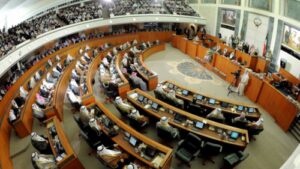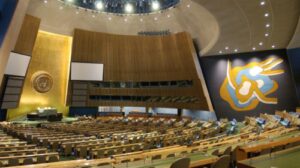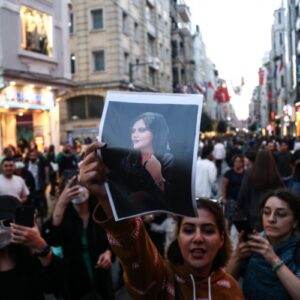
The National Interest Foundation Newsletter
Issue 161, September 22, 2022
Welcome to our NIF Newsletter. In this week’s headlines: Kuwait prepares for upcoming elections in the wake of last month’s dissolution of parliament, negotiations to resolve the Lebanon-Israel maritime border dispute over drilling rights and gas fields continue while Israel vows to begin production in contested areas, the 77th session of the United Nations General Assembly takes place in New York, and outrage spreads after Iranian woman Mahsa Amini’s wrongful detainment and suspicious death while in police custody.
Upcoming Elections in Kuwait

Early elections in Kuwait on September 29th will seek to find solutions to many pressing issues following the recent dissolution of parliament. (Photo from AP)
Kuwait Prepares for Upcoming Elections in the Wake of Last Month’s Dissolution of Parliament
Last month on August 2nd, Crown Prince Sheikh Meshal al-Ahmad al-Sabah announced the formal dissolution of the Kuwaiti parliament via decree and a plan to hold elections on September 29th. The move to dissolve parliament is far from a first in Kuwaiti politics. Since the current political system was put into place in 1963, parliament has been dissolved 10 times, and each time, parliament has been dissolved in an effort to revive paralyzed talks between the government and parliament. This particular case was no different. In the time since the election of the recently dissolved parliament in December of 2020, mass resignations of cabinet members had taken place four times in response to votes of no confidence from parliament. As for the members of parliament (MPs), there had been considerable contention with Prime Minister Sheikh Sabah al-Khalid and Speaker Marzouq al-Ghanim, both of whom were thought to be too pro-government to cooperate with them. Al-Khalid has since been replaced by more open-minded Shaykh Ahmed Nawaf al-Ahmed al-Sabah and there will be a new speaker of parliament following the upcoming early elections on September 29th.
In reality, the “dissolution” of parliament is really a call for such early elections, and less troubling in regard to authoritarianism than one might think, according to political scientist at the University of Kuwait, Dr. Ghanim al-Najjar. During a Gulf International Forum (GIF) panel discussion with other experts on earlier this week on Tuesday, Dr. Ghanim explained in great detail that the political problem in Kuwait is not fair elections, but the whole of the government structure. The parliament is also known as the National Assembly, which works with the royal family-dominated government to enact policies under Kuwait’s semi-democratic system. The 50 MPs hold important roles, although it is the royal family that is allowed the final decision on all matters, according to the constitution. Dr. Ghanim explained that the power balance created by such a system always places the ruling family and the “bureaucracy” in a position to make all of the real decisions. Dr. Courtney Freer, a Middle East researcher at GIF and the Middle East Centre in London, elaborates further on Dr. Ghanim’s point in a recent publication. She claims that the reason that Kuwaiti politics continue to become deadlocked is because the members of cabinet are also voting members of the National Assembly, despite the fact that they are not elected by the people or by the MPs, but rather by the ruling family. As a result, any changes that the “opposition” tries to make are immediately stifled by the government’s overbearing presence. Additionally, Kuwait’s MPs have a history of trying to create change through constant interpellation of cabinet members rather than trying to move legislation through the proper channels.
But despite the fact that history has repeated itself almost a dozen times in 60 years, there is hope among Kuwaitis that the elections taking place in less than two weeks will be a new beginning for Kuwaiti politics. This is the first time in Kuwait’s history that the dissolution of parliament has been government-led, which some hope signals a renewed spirit of collaboration. Since the dissolution of parliament, the ruling family has also put several new electoral laws into place that are popular among the people. One such regulation is that all Kuwaiti citizens are now automatically registered to vote, which increases the total electorate by 25% and by up to 40% in some districts. In addition, “tribal” elections – a form of primary election that advantages candidates from large tribes – have been cracked down upon, and Prime Minister Shaykh Ahmed Nawaf al-Ahmed al-Sabah has assured that the government will not interfere in the election of the next speaker of parliament. These changes come at an important time in Kuwaiti politics, as the former parliament left countless issues unresolved, including housing, the diversification of the economy, and the approval of the budget for the 2022/23 fiscal year.
Unfortunately, there is significant doubt that the September 29th election will do anything to foster a smoother relationship between parliament and the government. Experts, including Dr. Ghanim and Dr. Freer, strongly believe that what is occurring in Kuwait is nothing new. Dr. Ghanim has made it clear that electoral rules change very frequently in Kuwait – but what has not changed is the power dynamic. Barring unforeseen events, it is unlikely to change now.
Israel Vows to Begin Gas Production Despite Ongoing Negotiations

Negotiations to resolve the longstanding maritime dispute are ongoing, with the United States playing a mediating role. (Photo from AFP)
Negotiations to Resolve the Lebanon-Israel Maritime Border Dispute over Drilling Rights and Gas Fields Continue While Israel Vows to Begin Production in Contested Areas
Earlier this week, Israeli officials vowed to begin gas production in contested areas, despite the fact that negotiations to resolve the Lebanon-Israel maritime border dispute over drilling rights and gas fields are still ongoing. While progress is being made, and some have highlighted that talks are entering the final stages, Israel has stated that production from the Karish gas field is “not connected to these negotiations and will commence without delay as soon as it is possible.” Observers have lamented this disregard and insensitivity for the ongoing negotiations, and worry that it could play a destructive role in serving to fuel tensions. U.S. officials are engaged in mediation attempts aimed at reaching an agreement to resolve the maritime border dispute, and have suggested that a deal could be finalized soon. In recent days, Lebanese officials involved in the negotiations were slated to meet with U.S. mediators in New York, as efforts towards the aim of striking an agreement continue.
Karish’s location in the Eastern-Mediterranean Sea and its untapped gas field makes it a potential location for conflict, if provocative actions are not held in check. Thus, Israel’s remarks earlier this week threaten to raise tensions and come at a very sensitive time while efforts are being made to address the dispute. Hezbollah officials in Lebanon have expressed that “as long as extraction has not started, there is a chance for solutions” regarding the issue. As a result, Israel’s comments risk derailing the negotiation process and are not diplomatically appropriate for a matter that is still ongoing. Israel set up a gas rig at Karish back in June, but Lebanon insists that this is in disputed waters. Over the preceding months, Hezbollah has issued multiple warnings to Israel to not start production without a deal in place, while Israel has responded by stating that Lebanon would “pay the price” for any Hezbollah attacks.
Negotiations to resolve the longstanding Lebanon-Israel maritime border dispute have been taking place on and off since 2011. Lebanon has been steadfast that Karish is in disputed waters and thus Israel cannot set up their gas rig there, while Israel claims that the area is within its “economic waters.” Both see the issue as a defense of their rights to drilling and economic benefits. After Israel brought a production vessel into the Karish gas field several months ago despite the unresolved negotiations, Hezbollah responded by launching unarmed drones towards the area. Karish is minimal in terms of global supply but represents a significant economic boon for Israel and Lebanon, the latter of which in particular is currently suffering from an economic crisis which could be slightly alleviated by the gain that oil production could potentially supply. For Israel, gas production has been up by over 20% so far this year as a result of the ongoing Russia-Ukraine war. The disputed Karish field is estimated to hold as much as 2-3 trillion cubic feet of natural gas and 44 million barrels of liquid.
Any provocative actions by either side could spark an outbreak of conflict, and as such, now more than ever, observers have pointed out the importance of addressing the maritime border dispute and expressed a sense of urgency to get a deal finalized as soon as possible. Some have speculated that a potential compromise could call for a border running in the north of Israel’s portion of Karish which would permit Lebanon to carry out offshore drilling at a site it is developing. Elias Bou Saab, Lebanon’s deputy parliament speaker and lead negotiator on the maritime border dispute with Israel, arrived in New York earlier this week for continued talks with mediators as officials suggest that talks have entered the final stages. Ultimately, if it is reached, an agreement would represent a notable diplomatic breakthrough.
77th Session of the U.N. General Assembly

For the first time in three years, the United Nations General Assembly is meeting almost entirely in-person in the latest effort to assuage deep geopolitical divides. (Photo from UN)
The 77th Session of the United Nations General Assembly Takes Place in New York
From Tuesday of this week until next Monday, well over 100 delegates from around the world are meeting at UN headquarters in New York City for the 77th session of the United Nations General Assembly. This year’s assembly is expected to be a solemn and focused one considering the depth of crisis in which much of the world finds itself. The issue expected to take center stage is unsurprisingly the war in Ukraine. Thus far, this has certainly been the case. Before general debate even began Tuesday morning, conversation got heated last week regarding whether Ukraine’s President Volodymyr Zelenskyy should be allowed to give a speech via video call. Opponents of the notion rejected it based on the premise that it was a biased decision and courtesy that had not and would not be extended to other countries. Accordingly, Belarus proposed an amendment that struck the language concerning the war in Ukraine from the motion and added language that would allow other countries to take the same action in the future. The amendment was thrown out and the motion passed overwhelmingly, 101-7. As such, President Zelenskyy gave his address to the general assembly on Wednesday. The firmly-worded speech accused neutral nations of taking the side of Russia, in addition to calling for Russia to be economically and physically (via visa restrictions) cut off from the rest of the world. Zelenskyy also suggested the formation of a tribunal regarding Russia. The Ukraine-Russia conflict has remained a major talking point in the speeches of almost all world leaders. In his address Wednesday afternoon, U.S. President Biden spent most of his time on the invasion, again reaffirming the United States’ staunch support of Ukraine. In addition to the violence that the war has imposed upon the world, it has also caused dramatic, worldwide food shortages. Certain countries that make up the Horn of Africa, for example, that heavily rely on Ukraine and Russia for food, have been left with nothing, and on top of that, the conflict has diverted almost all relief funds from international actors towards the war effort and away from other places that need it. Representatives from several regions – including Asia, Africa, and Latin America – have expressed discontent that their countries’ issues are being pushed aside solely in favor of the plight of Ukraine.
In his opening remarks, Secretary General António Guterres spoke passionately about climate change and the deteriorating state of human rights across the globe. Other speakers spoke on these same matters at length, indicating that they will also play an important role at this year’s conference.
Though not as popular, there were also a wide variety of other issues brought up Tuesday morning. Senegalese President Macky Sall, for instance, called for the UN to do more to combat terrorism in Africa so that Africans may actually benefit from their relationship with the UN. On Wednesday, Côte D’Ivoire President Alassane Ouattara reiterated the importance of the fight against terrorism in Africa.
In addition to what has already been said, it is also expected that the issues of Iran and Afghanistan will find their fair share of the spotlight over the course of this week. Iranian president Ebrahim Raisi is in attendance and also spoke during yesterday’s action-packed session. Raisi stressed that he is serious about nuclear negotiations, but wary that the United States is an untrustworthy entity. On a separate note, he weighed in on the Ukraine-Russia deliberations by citing what he viewed as a hypocritical view of the invasion shared by most countries. In his mind, much of the Middle East, including Iran, has been similarly invaded by entities such as the United States with no cause. Raisi has a long track record of human rights violations, as does Iran as a whole, where a young woman was beaten to death last week for supposedly violating laws about head coverings. Secretary General Guterres has said that he intends to speak with Raisi about both this and the ubiquitous nuclear deal negotiations.
As for Afghanistan, none of its leaders will be in attendance, as they are Taliban members with international travel bans. However, the government there has been looking to become a greater part of the international scene, which is, of course, concerning. Just last week, the U.S. pledged $3.5 billion to the Afghani people, with the intent of somehow keeping the money away from the Taliban. Naheed Farid, a former member of the Afghani government, said in an interview that the situation for women and girls is hitting an all-time low, and has petitioned the international community to come to their aid.
Surely more topics of discussion will come to the forefront as the talks progress, but one can be sure that the overarching theme of this year’s session will be international cooperation and the rebuilding of important connections following a three-year in-person hiatus caused by the COVID-19 pandemic. In the words of Guterres, “our world is in peril – and paralyzed.” The UN General Assembly’s 77th session will work to address that.
Outrage Over Death of Mahsa Amini

The incident has drawn widespread outrage, both inside Iran and around the world. (Photo from Getty Images)
Outrage Spreads After Iranian Woman Mahsa Amini’s Wrongful Detainment and Suspicious Death While in Police Custody
The recent wrongful detainment and death of an Iranian woman at the hands of the country’s “morality police” has drawn legitimate outrage, both domestically and around the world. Activists have highlighted the problematic nature with the incident, and how citizens should not be subjected to human rights violations and abuses merely for what they choose to wear or not wear. Iranian authorities enforce a strict hijab law which mandates women cover their hair and wear loose fitting robes in public spaces. Punishment for violating these laws range from a fine to flogging and imprisonment. Mahsa Amini, the victim, was detained on the streets of Tehran while she was visiting with her family, who reported that she was following the parameters of the law and thus do not understand the reasoning for her detainment. The police did not offer an explanation as to why she was detained, stating only vaguely that it involved the hijab rule. In addition to sparking international outrage and protests, Amini’s death also prompted the U.S. Department of the Treasury’s Office of Foreign Assets Control (OFAC) to sanction and condemn Iran’s “morality police” for abusive behavior and the violation of the rights of peaceful Iranian protesters.
With their sanctions, OFAC is targeting a handful of senior leaders of Iran’s security organizations: the “Morality Police,” the Ministry of Intelligence and Security, the Army’s Ground Forces, the Basij Resistance Forces, and the Law Enforcement Forces. These officials oversee organizations that routinely employ violence to suppress peaceful protesters and members of Iranian civil society, political dissidents, and women’s rights activists. Iran’s security forces published a statement suspiciously claiming that Amini suddenly collapsed from a heart attack at the detention center while receiving educational training on hijab rules. However, while she was in police custody, her brother who reportedly was sitting outside the detention center, heard screaming from the inside of it.
Since it went into effect in 1981 after the Islamic revolution, Iran’s mandatory hijab laws have been contested by many women and rights activists. Multiple protests have broken out recently after Amini’s death, with activists taking to the streets in protest against the hijab laws and “morality police.” Many believe that these laws are imposed to restrict women’s freedoms, and observers have outlined the unnecessary and disproportionate use of force against them. Multiple people have reportedly been shot and beaten by the police during these latest rounds of protests. The reaction from police forces has been severe, as more than 35 female protesters have been arrested in the capital and could face up to 10 years in prison.
Women’s rights activist Masih Alinejad started a campaign five years ago known as the stealthy freedom movement, where Iranian women were encouraged to share moments of secret freedoms against these mandatory headscarf laws. She states that she has no regrets about starting this movement even though Alinejad is subjected to daily death threats, cannot go back to Iran to visit family for fear of arrest, and some family members no longer speak to her.
The Iranian regime has a long history of prisoner abuse and repression, with some recent examples including the brutal crackdown in November of 2019 whereby authorities used excessive and unlawful force against masses of protesters blocking roads and throwing stones. During the crackdown, authorities ordered the near-total shutdown of internet across the country, and according to Amnesty International, at least 304 people were killed.
Enter the text or HTML code here
